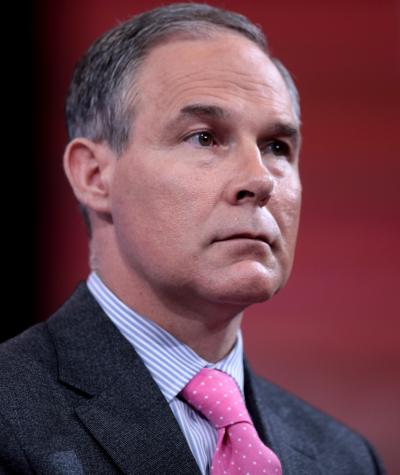Pruitt’s political career in Oklahoma included many of the same themes as his tenure atop the Environmental Protection Agency (EPA), the New York Times reported over the weekend. When Pruitt served as Oklahoma attorney general, he used connections to get a sweet deal on a mansion (subsidized by telecom interests and owned by a shell company) and used his power to steer favorable regulatory actions and government contracts towards his business associates.
Additionally, an analysis CLC shared with the Times shows that Pruitt’s use of federal PAC money as Oklahoma Attorney General offered a preview of what was to come during Pruitt’s tenure at EPA: a preference for a luxury lifestyle and a commitment to making sure his inner circle gets paid handsomely.
In 2015, Pruitt set up a leadership PAC called Oklahoma Strong Leadership PAC. Its treasurer was Kenneth Wagner, who registered the shell company that owned Pruitt’s mansion, and who now holds a top political job at EPA.
Leadership PACs are supposed to exist so that officeholders can make contributions to other candidates and committees – but just nine percent of Pruitt’s Oklahoma Strong Leadership PAC spending went towards contributions to other candidates, PACs, and political parties.
Instead, when Pruitt was Attorney General he overwhelmingly used his leadership PAC for costly flights and expensive hotels. CLC found that the PAC had spent more than $7,000 in Hawaii in summer 2015 and 2016, $2,180 of which was spent at a Ritz-Carlton. Pruitt’s PAC spent $2,558 at the high-end Highland Dallas hotel, $878 at the Westin in Washington D.C.’s Georgetown neighborhood, and $625 at Arizona’s luxury Phoenician hotel. The PAC also put $4,000 toward dining, including a $661 meal at the Cafe Pacific, a high-end seafood restaurant in Dallas, Texas.
Pruitt’s leadership PAC also paid over $60,000 to Millan Hupp – the same Pruitt aide who received a hefty (and potentially improper) raise at EPA earlier this year.
Thanks to dysfunction at the Federal Election Commission (FEC) and the agency’s reticence in applying personal use rules to leadership PACs, Pruitt wasn’t the first politician to use a leadership PAC as a slush fund. But his spending put him among a handful of the worst offenders.
Before Pruitt joined the EPA, it was the special interests who donated big checks to his leadership PAC footing the bill for his high-end travel costs and paychecks for his inner circle. Now that he is at EPA, it is taxpayers.
Pruitt’s improprieties have been numerous in his short tenure at EPA. They have been serious enough that the federal government’s top ethics official, David Apol at the Office of Government Ethics (OGE), took the unusual step of sending a letter to the EPA questioning a series of actions by Pruitt and asking the agency to take “appropriate actions to address any violations.”
This was after CLC revealed that Pruitt failed to provide agency ethics officials with a full set of facts surrounding his lease of a Capitol Hill condominium from an energy lobbyist whose firm had business matters before the EPA. As a result, the ethics officials only assessed the propriety of the arrangement based on the lease document, which provided the nightly rate of the room and other boilerplate terms. Even without the additional details, the deal on its face was enough to raise concerns. These concerns turned out to be justified after the Washington Post discovered that the lobbyist whose wife rented Pruitt his condo got special access and helped arrange a meeting about environment issues.
Perhaps the most troubling aspect of Pruitt’s tenure has been his inclination to avoid oversight from both within and outside his agency. When agency staff members raised concerns about the condo rental and other actions, they found themselves transferred or demoted, according to OGE.
There is trouble in the water at the EPA. Administrator Scott Pruitt is under investigation for allegations of spending largesse, ethical lapses and other issues, including his interactions with lobbyists. 170 lawmakers have signed a resolution calling for his resignation. In a bad sign for Pruitt’s future, the Office of Management and Budget (OMB) announced publicly that they are reviewing EPA, even though OMB typically operates quietly behind the scenes. That means that there are concurrent inquiries into Pruitt’s conduct by the inspector general, the House, the Senate and now OMB.
In order to maintain public trust in government, cabinet-level leaders must set the tone on ethical leadership in order to expect rank-and-file public servants to uphold those standards. The success of our government depends on it, and Americans should demand nothing less of our leaders.
